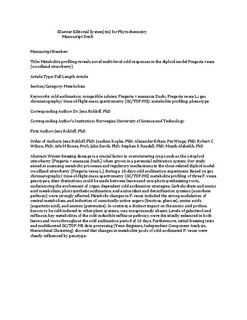Metabolite profiling reveals novel multi-level cold responses in the model Fragaria vesca (woodland strawberry)
Rohloff, Jens; Kopka, Joachim; Erban, Alexander; Winge, Per; Wilson, Robert Charles; Bones, Atle M.; Davik, Jahn Eldar; Randall, Stephen K; Alsheikh, Muath
Original version
Rohloff, J., Kopka, J., Erban, A., Winge, P., Wilson, R. C., Bones, A. M., . . . Alsheikh, M. (2012). Metabolite profiling reveals novel multi-level cold responses in the model Fragaria vesca (woodland strawberry). Phytochemistry. doi: 10.1016/j.phytochem.2012.01.024 http://dx.doi.org/10.1016/j.phytochem.2012.01.024Abstract
Winter freezing damage is a crucial factor in overwintering crops such as the octoploid strawberry (Fragaria × ananassa Duch.) when grown in a perennial cultivation system. Our study aimed at assessing metabolic processes and regulatory mechanisms in the close-related diploid model woodland strawberry (Fragaria vesca L.) during a 10-days cold acclimation experiment. Based on gas chromatography/ time-of-flight-mass spectrometry (GC/TOF-MS) metabolite profiling of three F. vesca genotypes, clear distinctions could be made between leaves and non-photosynthesizing roots, underscoring the evolvement of organ-dependent cold acclimation strategies. Carbohydrate and amino acid metabolism, photosynthetic acclimation, and antioxidant and detoxification systems (ascorbate pathway) were strongly affected. Metabolic changes in F. vesca included the strong modulation of central metabolism, and induction of osmotically-active sugars (fructose, glucose), amino acids (aspartatic acid), and amines (putrescine). In contrast, a distinct impact on the amino acid proline, known to be cold-induced in other plant systems, was conspicuously absent. Levels of galactinol and raffinose, key metabolites of the cold-inducible raffinose pathway, were drastically enhanced in both leaves and roots throughout the cold acclimation period of 10 days. Furthermore, initial freezing tests and multifaceted GC/TOF-MS data processing (Venn diagrams, Independent Component Analysis, Hierarchical Clustering) showed that changes in metabolite pools of cold-acclimated F. vesca were clearly influenced by genotype.
